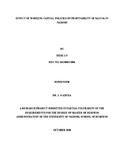| dc.description.abstract | The effect of working capital financing policies on profitability of SACCOs, however, was still unexplored area in the working capital financing literature. This study sought to bridge this knowledge gap by investigating how the working capital financing policies affect profitability SACCOs in Nairobi. The objective of this study was to investigate the effect of working capital financing policies on profitability of SACCOs in Nairobi.
The research design was a cause-effect (causal) study aimed at investigating working capital financing policies among SACCOs in Nairobi. The population of this study was all the SACCOs in Nairobi. The population of interest of this study was selected using systemic random sampling method to come up with a sample size of thirty five (35) SACCOS. The questionnaires were administered using drop and pick method. The questionnaires were used because they allowed the respondents to give their responses in a free environment and help the researcher get information that would not have been given out had interviews been used.
The study found that working capital management is important because of its effects on the firm's profitability and risk, and consequently its value. The study sought to establish the extent of respondents' agreement with the various statements about working capital in the SACCOs. It was established that the SACCOs employ investing heavily in working capital as a strategy for net working capital management; SACCOs adopted working capital hedging policies designed to increase sales and used minimizing working capital investment.
It was clear from the study that firms' that exhibit low degrees of financial constraints have pronounced counter-cyclical leverage, the ability of the firm to continuously operate in longer period is depends on how they deal with investment in working capital management, firms with high liquidity of working capital may have low risk then low profitability and cash conversion cycle is a key factor in working capital management.
The study concludes that conservative policy reduces supply costs and protects against price fluctuations, conservative policy allows customers to check that the merchandise they receive is as agreed, conservative policy reduces the cost of possible interruptions in the production process, helps firms to strengthen long-term relationships with their customers and reduces loss of business due to the scarcity of products, while they disagreed that conservative policy ensures that the services contracted are carried out. | en_US |

